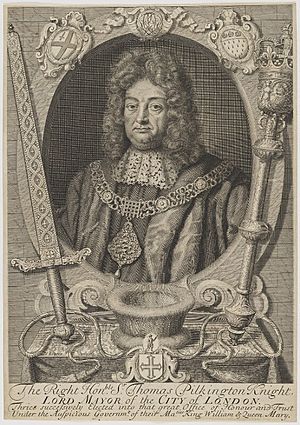Thomas Pilkington facts for kids
Sir Thomas Pilkington (died 1691) was an English merchant and a Whig politician. He held the important position of Lord Mayor of London in 1689.
Contents
Early Life and Business
Thomas Pilkington was born in Northampton. His father was also named Thomas Pilkington, and his mother was Anne Mercer. His grandfather, John Pilkington, was from Oakham in Rutland.
Young Thomas moved to London when he was still quite young. He became a very successful merchant. He was a member of the Skinners' Company, which was a guild for people who worked with animal skins. He was even the leader of this company in 1677, 1681, and 1682.
Becoming a City Leader
Pilkington was an early supporter of the Whig political group. This group was involved in a big debate called the Exclusion Crisis. He was chosen as one of four representatives for the City of London in Parliament in 1679.
During a discussion in Parliament, Pilkington said he wished James, Duke of York would return from abroad. He wanted him to face serious charges. Pilkington was elected to Parliament again in 1680. In December of that year, he became an alderman for the Farringdon Without area.
Sheriff of London
In June 1681, Pilkington and Samuel Shute were elected as Sheriffs of London. This was a big win for the citizens over the King's supporters. They won by a large number of votes.
The King was not happy about this election. However, Pilkington hosted parties at his home for important Whig leaders. These included the Duke of Monmouth and Anthony Ashley Cooper, 1st Earl of Shaftesbury. Meanwhile, the Lord Mayor, Sir John Moore, who supported the King, held similar gatherings.
Facing Challenges
In March 1682, Pilkington faced a legal case for saying something untrue about someone. The jury decided he had to pay £800 in damages. Pilkington disagreed with the amount. The case eventually went to the House of Lords, which confirmed the decision in 1689.
Later, in June 1682, Pilkington and Sheriff Shute were in charge of electing new sheriffs. They used their power to stop the Lord Mayor, Sir John Moore, from getting his preferred candidates elected. The Lord Mayor then told the King that the sheriffs had caused trouble.
Pilkington and Shute were called before the King's council. They were accused of causing a disturbance. Their trial happened in February 1683. They were found responsible in May and had to pay large fines in June. Pilkington's fine was £500. This decision was later overturned in 1689.
Pilkington's time as Sheriff ended in September 1682. He and Shute chose not to host the traditional dinner for the Lord Mayor. The problems caused by Pilkington and Shute were part of the reason the city's special rights were suspended in 1683.
More Legal Troubles
After leaving his Sheriff role, Pilkington faced more difficulties. James, Duke of York sued him for making false statements. Pilkington was accused of refusing to join a group from the city to greet the Duke in April 1682. He was also accused of saying the Duke had caused the Great Fire of London.
The Duke asked for £100,000 in damages. The case was heard in November 1682. The jury decided Pilkington had to pay the full amount. Pilkington then went to prison and gave up his position as alderman. He stayed in prison for almost four years. He was finally released by the King's order in June 1686.
Return to Power
When King James II left the country and Prince William of Orange arrived in 1688, Pilkington gained royal favor. He was elected alderman for the Vintry area in February 1689. He also got his old position and rank back. He was again chosen to represent the city in Parliament.
When the Lord Mayor, Sir John Chapman, suddenly passed away in March 1689, Pilkington was elected to finish his term. In April 1689, the King made him a knight. In September, he was elected Lord Mayor for the next year. At his special dinner, he hosted King William and Queen Mary, along with Prince George and Princess Anne.
A new law in May 1690 said that a Lord Mayor should be elected again. Pilkington was chosen for the third time. In December 1690, some city officials complained to Parliament. They said the Lord Mayor and aldermen were taking too much power. This issue was debated in Parliament.
Later Life and Legacy
Sir Thomas Pilkington did not live long after his third time as Lord Mayor. He passed away on December 1, 1691. His home in London was on Bush Lane.
A painting of Pilkington is kept at Skinners' Hall. There is also a picture of him from 1691 by Robert White. Another picture by Robert Dunkarton shows him in Puritan clothing.
Family Life
Pilkington was married to Hannah Bromwich from London. They had two sons together.
 | Sharif Bey |
 | Hale Woodruff |
 | Richmond Barthé |
 | Purvis Young |


